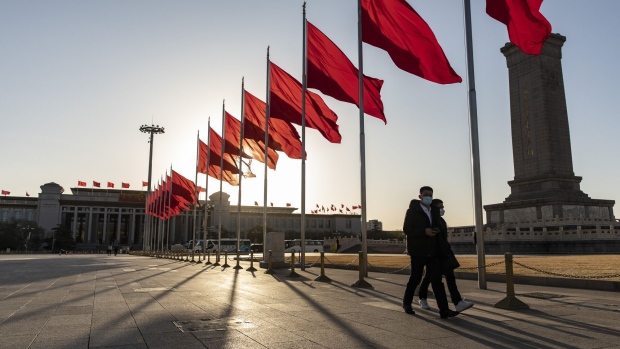Jul 17, 2023
US Limits on China Tech Investment to Be Narrow and Slow
, Bloomberg News

(Bloomberg) -- The Biden administration’s plans to restrict investments in China will be narrowly focused on cutting-edge technology, only new investments, and likely won’t go into effect until next year as the policy grinds through Washington’s bureaucracy.
Officials are aiming to wrap up a proposal by the end of August for the long-delayed program to screen and possibly prohibit investment in China’s semiconductor, quantum-computing and artificial intelligence sectors, according to people familiar with the plans, who asked not to be identified because the details are still private.
In a sign of how the administration’s early ambitions have been cut back, the restrictions are likely only to apply to new investments, and the administration has also decided to spare the biotechnology and energy sectors, the people said.
US Treasury Secretary Janet Yellen highlighted the limited scope of the plans in an interview with Bloomberg Television on Monday, saying the restrictions would be “narrowly targeted.” That will come as some relief for firms seeking an opening to China’s market or investors concerned with broader economic growth.
“These would not be broad controls that would affect US investment broadly in China, or in my opinion, have a fundamental impact on affecting the investment climate for China,”she said.
Even when the proposals are complete, the pace of America’s policymaking machinery means the program, to be issued by executive order, likely won’t go into effect until 2024 at the earliest. That will disappoint China hawks looking for tougher, faster action but could give the administration more time to navigate between its desire to impose effective controls while also easing tensions with China, which has chafed at previous limits.
A spokesman for the White House and the National Security Council declined to comment.
China pushed back against the idea of proposed investment curbs. “China opposes US politicizing and weaponizing trade and tech issues,” Chinese Foreign Ministry Spokeswoman Mao Ning said during a regular press briefing on Tuesday. “It is in no one’s interest to place arbitrary curbs on normal technology cooperation and trade.”
The so-called outbound investment controls are part of the White House’s broader effort to limit China’s capabilities in developing the next-generation tech expected to dominate military and economic security. That includes steps to limit the sales of advanced semiconductors and the tools to develop them.
Rocky Relations
Those efforts have complicated relations with Beijing, which sees the restrictions as an attempt to contain and isolate China just as its economy is faltering. They’ve also angered US chip firms including Intel Corp. and Nvidia Corp., which expect the country’s massive market to drive revenue growth. Their CEOs were in Washington on Monday for a last-ditch effort to lobby White House officials not to go beyond existing curbs.
Meanwhile, in the venture capital world, Sequoia Capital’s decision to split its US and China operations into separate entities illustrates how tensions between the top two economies risk snarling the flow of money and expertise that helped earn billions in recent years from Chinese start-ups.
Investors should be relieved that “there really is an emphasis from the administration that they’re doing this carefully,” said Emily Weinstein, a research fellow who focuses on US-China technology competition at Georgetown University’s Center for Security and Emerging Technology.
“Only your most egregious things will be outright prohibited,” Weinstein said, such as investing in the manufacturers of advanced semiconductors that list the Chinese military as a client.
The drafting and vetting of the program involves the White House and a bundle of cabinet departments including Treasury, Defense, State and Commerce.
Asked why it’s taken so long to propose the restrictions, Yellen said Monday that officials “want to make sure if we do this, that we get it right, and we’ve been working on the details.”
The administration plans to allow for a public comment period and engagement with Wall Street and the affected industries, which is expected to last months. It will then need to incorporate that feedback, which likely pushes the process into next year.
Yellen previewed the program for Chinese President Xi Jinping’s government on her trip to Beijing earlier this month. The goal, in part, was to make sure it doesn’t catch off guard America’s biggest geopolitical rival as well as one of its largest trading partners and holders of debt.
Treasury will administer the program, which has been described as an inverse of the Committee on Foreign Investment in the US, or CFIUS –- the Treasury-led process that reviews foreign investments for national security threats.
Emily Kilcrease, a senior fellow at the Center for a New American Security and a former deputy assistant trade representative, said the curbs will have real teeth in prohibiting some transactions but will be a letdown to some China hawks who had sought more sweeping proposals.
“Certainly there are some folks in the DC policy space who would want a much broader set of controls,” Kilcrease said. “But I think what she is saying is clearly signaling that’s not where the administration is going.”
--With assistance from Annmarie Hordern, Viktoria Dendrinou and Lucille Liu.
(Updates with response from China’s foreign ministry.)
©2023 Bloomberg L.P.





